 Robots can make workplaces more attractive for workers, the International Federation of Robotics says
Robots can make workplaces more attractive for workers, the International Federation of Robotics saysRather than being considered labour replacement devices, robots should be viewed as a recruitment tool by small and medium-sized enterprises, according to International Federation of Robotics (IFR) Dr Susanne Bieller general secretary.
With labour shortages affecting businesses around the world, IFR is asking businesses, especially manufacturing businesses, to rethink how they regard robots.
“Our members and their customers typically face the image that jobs in manufacturing are not cool, that they are physically demanding, often monotonous,” says Dr Bieller.
“By deploying robots, those dull parts of the jobs are handed over to the technology, while the human worker is much more is involved in controlling the robot and supervising that the robots are doing their jobs right and not running into any errors.
“This will make manufacturing jobs much more attractive and the raise the companies’ attractiveness as employers.”
With robots able to take on the “four Ds” of dull, dirty, dangerous and difficult work, human workers can used to carry out the more interesting jobs.
“Young people prefer to work in a company that uses future technology,” Dr Bieller says.
Robotics can also make workplaces safer.
“There are a reasonable number of accidents involved with human-controlled forklifts due to human inattentiveness,” Dr Bieller says.
“Automated forklifts have built-in safety features that make warehouses much safer spots to work.”
As part of its push for small and medium-sized enterprises to adopt robots in their workplaces, the IFR has launched a website, Go4Robotics, to raise awareness of the advantages robotics can provide.
The site features a formula for calculating the return on investing in automated mobile robots (AMRs).
Dr Bieller says adopting robotics in a workplace makes the company more productive and therefore more competitive.
“More workers are then needed to handle the orders and to carry out maintenance and servicing.”